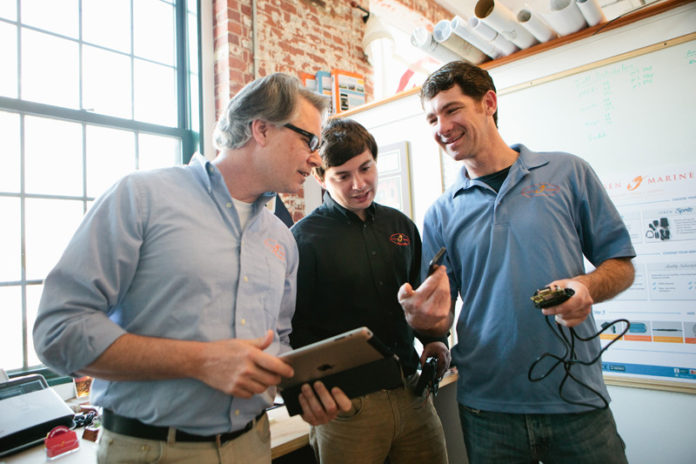
When you sell remote boat monitors, your market covers the waterways of the world.
Markets for the remote monitors produced by Providence-based Siren Marine have already been established in North America, the Caribbean and Europe.
Now parts of Africa have been added to the two-year-old technology company’s distribution map.
Siren Marine announced in April that it signed a contract with Equitorial Energy & Global Resources, an offshore support-services company focused on the oil and gas industries. That contract will bring marketing and distribution of Siren Marine products to African nations, including Nigeria, Angola, Liberia, Ghana, Senegal and others.
“All the offshore oil platforms use transport boats for the crew and provisions,” said Siren Marine Vice President and co-founder John McGarr.
Demand is growing rapidly for the company’s devices that monitor a boat’s vital systems, such as battery voltage, bilge pump, security, temperature and movement, he said.
“Any entities that have patrol boats could use our monitors. We had been working mainly with pleasure craft, but now we’re moving into more commercial and governmental markets,” he said.
The company is currently working with the Florida Fish and Wildlife Commission, which has 500 boats.
The two devices, the Pixie and the Sprite, manufactured by Siren Marine are similar, with the Sprite offering a few more functions. The Pixie records ambient temperature, for instance, in the cabin, while the Sprite has a remote temperature probe that can be used to monitor a specific area, perhaps a bait freezer on a sport-fishing boat.
“You can track everything through your cellphone. You can tell if your boat is drifting,” said Marketing Director Michael Moran. “If your boat starts to move, you get an initial text that it’s broken the GeoFence.
Siren Marine is working with eight boat companies to offer installation of the monitors, he said.
“You can imagine how important it is to a boat owner to know their bilge is not filled with water or the battery is not depleted,” said Hinckley spokeswoman Rosemary O’Brien. “It’s a peace-of-mind option.”
That’s the main idea Siren Marine pitches on its website: “You get peace of mind, without wasting electricity, money or time.”
The Pixie sells for $499 while the Sprite sells for $599, McGarr said.
“There’s not a single product on the market at this price, or in some cases at more than double the price, that has the functionality that ours does,” McGarr said.
One of the business decisions made to keep down the price and keep the product affordable for owners of large and small boats was to have it manufactured in China.
“The manufacturing facility we use is 100 percent robotic. We share manufacturing space with some of the Apple products,” McGarr said. “We looked at building our products here, but it would be cost-prohibitive.”
Every device goes through testing to make sure it can withstand things like shocks and variations in temperature. GPS inputs are also tested.
Rhode Island is a natural base for Siren Marine, said McGarr, although the company launched in Mystic, Conn. in 2011, after founder Daniel Harper spent five years developing the product, McGarr said.
The first big event where the product was shown was the Newport International Boat Show, he added.
Last year, Siren Marine won top prize in the Rhode Island Business Plan Competition. It had already made known its intention to move to the Ocean State.
The money from the Business Plan Competition win gave Siren Marine a kick-start.
“That allowed us to pay for our CE certification so we could distribute our products in Europe,” McGarr said. •












